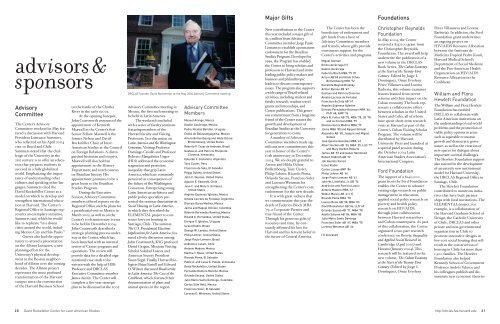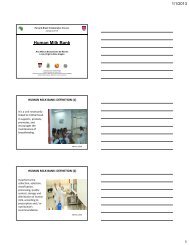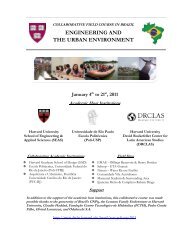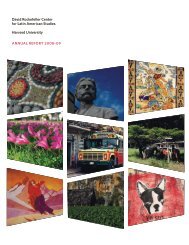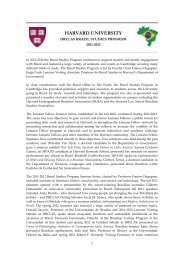Create successful ePaper yourself
Turn your PDF publications into a flip-book with our unique Google optimized e-Paper software.
advisors&<br />
sponsors<br />
Advisory<br />
Committee<br />
The Center’s Advisory<br />
Committee weekend in May featured<br />
a discussion with Harvard<br />
President Lawrence Summers,<br />
who reflected on his April 2004<br />
visit to Brazil and Chile.<br />
Summers noted that the challenge<br />
of the University in the<br />
21st century is to offer an <strong>edu</strong>cation<br />
that prepares students to<br />
succeed in a fully globalized<br />
world. Emphasizing the importance<br />
of understanding other<br />
cultures and speaking other languages,<br />
Summers cited the<br />
David Rockefeller Center as a<br />
model on which to develop and<br />
strengthen international <strong>edu</strong>cation<br />
at Harvard. The Center’s<br />
Regional Office in Santiago represents<br />
an exemplary initiative,<br />
Summers said, which he would<br />
like to replicate “in a dozen<br />
cities around the world, including<br />
Mexico City and São Paulo.”<br />
Guests also had the opportunity<br />
to attend a presentation<br />
on the Allston Initiative, a new<br />
planning effort for the<br />
University’s physical development<br />
in the Boston neighborhood<br />
of Allston over the coming<br />
decades. The Allston project<br />
represents the most profound<br />
transformation of the Harvard<br />
campus since the construction<br />
of the Harvard Business School<br />
on the banks of the Charles<br />
River in the early 1900s.<br />
At the opening banquet,<br />
John Coatsworth announced the<br />
appointment of Kenneth<br />
Maxwell as the Center’s first<br />
Senior Fellow. Maxwell is the<br />
former Nelson and David<br />
Rockefeller Chair of Inter-<br />
American Studies at the Council<br />
on Foreign Relations. A distinguished<br />
historian and essayist,<br />
Maxwell will also hold an<br />
appointment in the History<br />
Department and teach courses<br />
on Brazilian history. His<br />
appointment promises to be a<br />
great boon to the Brazilian<br />
Studies Program.<br />
During the Executive<br />
Session, Advisory Committee<br />
members offered reports on the<br />
Regional Office and the plans for<br />
a presidential visit to Mexico in<br />
March 2005, as well as on the<br />
Center’s 10th anniversary events<br />
to be held in December 2004.<br />
John Coatsworth described a<br />
strategic planning process underway<br />
at the Center, which has<br />
been launched with an internal<br />
review of Center programs and<br />
operations. The review will<br />
provide data for a detailed organizational<br />
case study to be<br />
written with the help of HBS<br />
Professor and DRCLAS<br />
Executive Committee member<br />
James Austin. The Center will<br />
complete a five-year strategic<br />
plan to be discussed at the 2005<br />
DRCLAS founder David Rockefeller at the May 2004 Advisory Committee meeting.<br />
Advisory Committee meeting in<br />
Mexico, the first such meeting to<br />
be held in Latin America.<br />
The weekend concluded<br />
with a series of faculty seminars<br />
featuring members of the<br />
Harvard faculty and Visiting<br />
Professors. In a discussion on<br />
Latin America and the Washington<br />
Consensus, Visiting Professor<br />
Domingo Cavallo and Professor<br />
Roberto Mangabeira Unger<br />
(HLS) addressed the economic<br />
stagnation and persistent<br />
inequality that grip Latin<br />
America, which are commonly<br />
perceived as consequences of<br />
the failure of the Washington<br />
Consensus. Enterprising young<br />
Latin American architects and<br />
public policy specialists presented<br />
the seminar Innovations in<br />
Social Housing in Latin America,<br />
in which they described the<br />
ELEMENTAL project to construct<br />
low-cost housing in<br />
Santiago, Chile. The seminar,<br />
The U.S. Presidential Elections:<br />
Implications for Latin America, featured<br />
a lively discussion among<br />
John Coatsworth, KSG professor<br />
David Gergen, Mexican Visiting<br />
Scholar Soledad Loaeza and<br />
Americas Society President<br />
Susan Segal. Finally, Harvard biologists<br />
Brian Farrell and Edward<br />
O. Wilson discussed Biodiversity<br />
in Latin America: The Case of the<br />
Caribbean, which featured their<br />
documentation of plant and<br />
animal species in the region.<br />
Advisory Committee<br />
Members<br />
Manuel Arango, Mexico<br />
Gastón Azcárraga, Mexico<br />
Pedro Nicolás Baridón, Uruguay<br />
Eneko de Belausteguigoitia, Mexico<br />
Arturo Brillembourg and Hilda Ochoa-<br />
Brillembourg, United States<br />
Roberto P. Cezar de Andrade, Brazil<br />
Gustavo A. and Patricia Phelps de<br />
Cisneros, Venezuela<br />
Eduardo F. Costantini, Argentina<br />
Tony Custer, Peru<br />
Francisco de Sola, El Salvador<br />
Peggy Dulany, United States<br />
John C. Duncan, United States<br />
Agustín E. Edwards, Chile<br />
Juan C. and Mary S. Enríquez,<br />
United States<br />
Angeles Espinosa Yglesias, Mexico<br />
Amalia Lacroze de Fortabat, Argentina<br />
Dionisio Garza Medina, Mexico<br />
Jaime and Raquel Gilinski, Colombia<br />
Roberto Hernández Ramirez, Mexico<br />
Roland A. Hernández, United States<br />
Enrique V. Iglesias, Uruguay<br />
Israel Klabin, Brazil<br />
George W. Landau, United States<br />
Philip Lehner, United States<br />
Jorge Paulo Lemann, Brazil<br />
Andrónico Luksic, Chile<br />
Antonio Madero, Mexico<br />
Martha T. Muse, United States<br />
Ricardo Poma, El Salvador<br />
Pablo A. and Luisa E. Pulido, Venezuela<br />
David Rockefeller, United States<br />
Fernando Romero Moreno, Bolivia<br />
Orlando Sacasa, United States<br />
Julio Mario Santo Domingo, Colombia<br />
Carlos Slim Helú, Mexico<br />
Francisco Soler, El Salvador<br />
Lorenzo D. Weisman, United States<br />
Major Gifts<br />
New contributions to the Center<br />
this year included a major gift of<br />
$1.5 million from Advisory<br />
Committee member Jorge Paulo<br />
Lemann to establish a permanent<br />
endowment for the Brazilian<br />
Studies Program. Developed in<br />
1999, the Program has enabled<br />
the Center to bring scholars and<br />
professors to Harvard and invite<br />
leading public policy makers and<br />
business and philanthropic<br />
leaders to discuss contemporary<br />
issues. The program also supports<br />
a wide range of Brazil-related<br />
activities, including student and<br />
faculty research, student travel<br />
grants and internships, and<br />
Center publications. This generous<br />
commitment from a longtime<br />
friend of the Center assures the<br />
growth and development of<br />
Brazilian Studies at the University<br />
for generations to come.<br />
A number of Advisory<br />
Committee members made significant<br />
new commitments this<br />
year in honor of the Center's<br />
10th anniversary in December<br />
2004. We are deeply grateful to<br />
Arturo and Hilda Ochoa-<br />
Brillembourg, Tony Custer,<br />
Philip Lehner, Ricardo Poma,<br />
Orlando Sacasa, Francisco Soler<br />
and Lorenzo Weisman for<br />
strengthening the Center’s core<br />
endowment for the new decade.<br />
It is with great sadness that<br />
we commemorate this year the<br />
death of Federico Bloch MBA<br />
’79, a Corporate Partner and<br />
true friend of the Center.<br />
Through his generous gifts of<br />
resources and time, he constantly<br />
affirmed his love for<br />
Harvard and his fervent belief in<br />
the future of Central America.<br />
The Center has been the<br />
beneficiary of endowment and<br />
gift funds from a host of<br />
Advisory Committee members<br />
and friends, whose gifts provide<br />
continuous support for the<br />
Center’s activities and programs:<br />
Miguel Aleman<br />
Emilio Azcárraga (†)<br />
Gastón Azcárraga<br />
Federico Bloch MBA ’79 (†)<br />
Arturo AB’68 and Hilda Ochoa<br />
Brillembourg MPA ’72<br />
Estrellita Bograd Brodsky<br />
Arthur Byrnes AB ’67<br />
Gustavo and Patricia Cisneros<br />
Amalia Lacroze de Fortabat<br />
Francisco de Sola AB ’67<br />
Angeles Espinosa Yglesias<br />
Ernesto Fernández-Holmann MPA ’66,<br />
PhD ’68, AMP ’76<br />
Mark B. Fuller AB ’75, MBA ’78, JD ’78<br />
and Jo Froman MBA ’79<br />
Dionisio Garza Medina MBA ’79<br />
Jaime MBA ’80 and Raquel Gilinski<br />
Alejandro AB ’68, Joaquin and Miguel<br />
Gómez<br />
José Ignacio González MBA ’67<br />
Albert Gordon AB ’23, MBA ’25, LLD ’77<br />
and Mary Gordon Roberts<br />
James AB ’57 and Isabel Hammond<br />
Robert Hildreth AB ’72<br />
Joli Quentin Kansil<br />
Israel Klabin<br />
Carlos Lacayo AMP ’84<br />
Philip Lehner AB ’46<br />
Jorge Paulo Lemann AB ’61<br />
John W. Littlefield, Jr. AB ’76<br />
Andrónico and Patricia Luksic<br />
Antonio Madero MBA ’61<br />
Wilbur Marvin AB ’41 (†)<br />
Ricardo Poma MBA ’70<br />
Lauren Reiss AB ’98, MBA ’03<br />
David Rockefeller SB ’36, LLD ’69<br />
Orlando Sacasa AB ’71, MBA ’78<br />
Adolfo Salume AB ’84, MBA ’85<br />
Julio Mario Santo Domingo<br />
Francisco Soler AB ’67, MBA ’70<br />
Lorenzo Weisman AB ’66<br />
Foundations<br />
Christopher Reynolds<br />
Foundation<br />
In May 2004, the Center<br />
received a $25,000 grant from<br />
the Christopher Reynolds<br />
Foundation. The award will help<br />
underwrite the publication of a<br />
new volume in the DRCLAS<br />
Book Series, The Cuban Economy<br />
at the Start of the Twenty-First<br />
Century. Edited by Jorge I.<br />
Domínguez, Omar Everleny<br />
Pérez Villanueva and Lorena<br />
Barberia, this volume examines<br />
lessons learned from recent<br />
reforms and their impact on the<br />
Cuban economy. The book represents<br />
a collaborative effort<br />
between scholars in the United<br />
States and Cuba, all of whom<br />
have spent short-term research<br />
visits at Harvard as part of the<br />
Center’s Cuban Visiting Scholar<br />
Program. The volume will be<br />
distributed by Harvard<br />
University Press and launched at<br />
a special panel session during<br />
the October 2004 Latin<br />
American Studies Association’s<br />
International Congress.<br />
Ford Foundation<br />
The support of a $140,000<br />
grant from the Ford Foundation<br />
enables the Center to advance<br />
cutting-edge research on public<br />
management in <strong>edu</strong>cation,<br />
applied social policy research on<br />
poverty and health policy<br />
research on HIV/AIDS,<br />
through joint collaboration<br />
between Harvard researchers<br />
and Cuban counterparts. As part<br />
of this collaboration, the Center<br />
organized a two-part research<br />
conference on Poverty, Inequality<br />
and Applied Social Research in<br />
Cambridge (April 2003) and<br />
Havana (January 2004). This<br />
research will be featured in the<br />
new volume, The Cuban Economy<br />
at the Start of the Twenty-First<br />
Century (Edited by Jorge I.<br />
Domínguez, Omar Everleny<br />
20 David Rockefeller Center for Latin American Studies <strong>http</strong>://<strong>drclas</strong>.<strong>fas</strong>.<strong>harvard</strong>.<strong>edu</strong> 21<br />
(†) deceased<br />
Pérez Villanueva and Lorena<br />
Barberia). In addition, the Ford<br />
Foundation grant underwrites<br />
an ongoing project on<br />
HIV/AIDS Resource Allocation<br />
between the Instituto de<br />
Medicina Tropical Pedro Kourí,<br />
Harvard Medical School’s<br />
Department of Social Medicine<br />
and the Pan-American Health<br />
Organization on HIV/AIDS<br />
Resource Allocation in the<br />
Caribbean.<br />
William and Flora<br />
Hewlett Foundation<br />
The William and Flora Hewlett<br />
Foundation has enabled<br />
DRCLAS to collaborate with<br />
Latin American institutions on<br />
the understanding of real-world<br />
problems and the promotion of<br />
viable policy options in areas<br />
such as equitable economic<br />
growth and democratic governance,<br />
as well as the creation of<br />
new spaces for dialogue about<br />
important societal challenges.<br />
The Hewlett Foundation support<br />
also assisted in the development<br />
of an entirely new institutional<br />
model for Harvard University:<br />
the DRCLAS Regional Office in<br />
Santiago, Chile.<br />
The Hewlett Foundation<br />
contributed to numerous initiatives<br />
that have built partnerships<br />
with local institutions. The<br />
ELEMENTAL project, for<br />
example, is a collaboration of<br />
the Harvard Graduate School of<br />
Design, the Catholic University<br />
of Chile, DRCLAS and other<br />
private and non-governmental<br />
organizations in Chile to<br />
promote innovative designs in<br />
low-cost social housing that will<br />
result in the construction of<br />
housing in Chile for more than<br />
1,500 families. The Hewlett<br />
Foundation also helped<br />
Kennedy School of Government<br />
Professor Andrés Velasco and<br />
his colleagues publish and disseminate<br />
new economic theories


